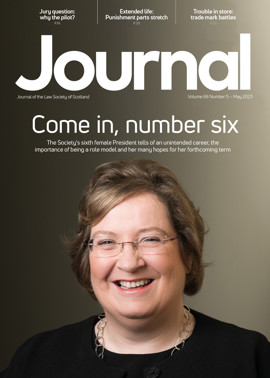Fit for the modern world?

Long-awaited legislation to modernise the Law Society of Scotland’s powers, and streamline legal complaint handling, was introduced to the Scottish Parliament on 21 April.
However the Society, while welcoming these aspects of the Regulation of Legal Services (Scotland) Bill, warned in its first statement that the proposed legislation “risks seriously undermining the independence of the legal profession from the state”. What does it contain, and what are the points of controversy?
Objectives
The bill’s 93 sections and three schedules are divided into five parts, with part 1 setting out the regulatory framework (in three chapters) and part 2 further provisions relevant to the Society.
Chapter 1 of part 1 sets out objectives, principles and key definitions. The regulatory objectives and professional principles in the Legal Services (Scotland) Act 2010, ss 1 and 2 are rewritten, the latter in virtually identical terms but the former more elaborately, as:
“(a) to support the constitutional principles of the rule of law and the interests of justice, (b) to protect and promote the interests of consumers and the wider public interest, (c) to promote – (i) access to justice, (ii) an independent, strong and diverse legal profession, (iii) quality, innovation and competition in the provision of legal services, and (iv) effective communication between regulators, legal services providers and bodies that represent the interests of consumers, and (d) for those regulating legal services to – (i) use and promote best practice…, (ii) adhere to the regulatory principles described in section 3(4), and (iii) promote and maintain adherence to the professional principles”.
Section 3 promotes principles regarding consumer access to legal services, and fair treatment of consumers; encouraging of equal opportunities; and exercise of regulatory functions in a way that is transparent, accountable, proportionate and consistent, targeted where action is needed, and exercised where possible in a way that contributes to sustainable economic growth. These reflect key aspects of the Better Regulation Principles, Consumer Principles, and Human Rights (PANEL) Principles.
Regulator categories
Under chapter 2, regulators will be assigned as either category 1 or category 2. Category 1 regulators are intended to be those with a significant membership or whose members provide largely consumer-facing services. Initially (ministers can reassign a body by regulations) only the Society is in category 1; the Faculty of Advocates, Association of Commercial Attorneys and any other approved body will be in category 2.
Both categories must exercise their regulatory functions independently of any other functions or activities, and “properly in all respects (in particular with a view to achieving public confidence)”, with internal governance arrangements designed to achieve that, and must publish annual reports. They must maintain a public register of authorised providers (individuals and business entities), and set professional indemnity insurance requirements.
As category 1, the Society will in addition have its Regulatory Committee made subject to further protections, including the right to appoint its own members, at least 50% of whom are to be lay and with a lay convener, and under a duty to produce its own annual report. The Society also remains under a duty to maintain a compensation fund, currently the Client Protection Fund.
The regime for licensed legal services providers remains separate and governed by the 2010 Act, due to the extra considerations arising from non-legally qualified investors being involved. A category 1 or 2 regulator may also regulate such providers.
Ministerial intervention
The first of the contentious powers of the Scottish ministers appear in ss 19 and 20. They (or their designated delegate) may review the performance of a regulator in either category on the request of the Parliament, the Competition & Markets Authority or Consumer Scotland, which may be made if there is concern over the proper exercise of regulatory functions. They must publish a report on their review, with findings and any proposed measures. These could include “(a) setting performance targets, (b) directing that action be taken, (c) publishing a statement of censure, (d) imposing a financial penalty, (e) making changes to, or removing some or all of, the regulatory functions exercised by the regulator”. Except for (d), the Lord President’s agreement is required to any of these steps. There is power to make regulations enabling additional measures, following consultation.
Chapter 3 of part 1 concerns authorisation of new regulators of legal services. An applicant body must draw up and publish a draft regulatory scheme; applications are to be considered by ministers and the Lord President acting together. They may also act together to require a regulator to review its regulatory scheme (failure to implement revisions properly could potentially lead to a regulator’s authorisation being revoked). Rights acquired may be surrendered in whole or part on application to both authorisers.
Ministers are further given powers to make provision for “(a) establishing a body with a view to it becoming a category 1 regulator for the purposes of this Part, (b) specifying circumstances under which the Scottish Ministers may directly authorise and regulate legal businesses”. This must be done with the agreement of the Lord President, and only if “the Scottish Ministers believe that their intervention is necessary, as a last resort, in order to ensure that the provision of legal services by legal businesses is regulated effectively”. This is designed to cover situations where an accredited regulator gets into difficulty in some way.
Authorising providers
Part 2 is again specific to category 1 regulators, making provision for their authorisation of legal services providers – or “legal businesses”, defined as solicitors or “qualifying individuals” (others who may come to be regulated by a category 1 regulator, such as tax advisers), or businesses wholly owned by such. A regulator must make authorisation rules and practice rules in respect of legal businesses, with “provision for reconciling different sets of regulatory rules”: this is to prevent or resolve regulatory conflicts, and avoid unnecessary duplication.
Ministers have power to specify what rules must cover, and must give prior approval (with the Lord President’s agreement) to “any material amendment”. There are also provisions for monitoring and review of performance of authorised businesses – and a further “last resort” section allowing ministerial intervention, with the Lord President’s agreement, if necessary to ensure efficient regulation.
SLCC reborn
Part 3, “Complaints”, opens by restyling the Scottish Legal Complaints Commission as the Scottish Legal Services Commission. In addition to services and conduct complaints, the Commission may receive complaints that an authorised business has failed to comply with its practice rules or the terms of its authorisation (a “regulatory complaint”), and complaints with any combination of the foregoing.
In future the Commission will be able to initiate a complaint itself, allow regulators to initiate and investigate certain complaints, and allow a category 1 regulator to investigate a regulatory complaint. It will also have more flexibility to develop a proportionate, risk-based and more responsive approach to dealing with complaints, with powers to make rules about how a complaint is to be handled depending on how it is categorised. Conduct complaint investigations will remain with the regulator concerned.
Provision is made to protect legal privilege in documents or information, but documents subject to any other right of confidentiality may be obtained, in line it appears with recent rulings by the Inner House.
Commission levies will be chargeable against authorised legal businesses as well as individuals. Unregulated legal services providers will be able to be entered in a new voluntary register to be kept by the Commission, on payment of an “annual contribution”, perhaps to obtain a mark of quality assurance.
The Commission is also given new powers to set and enforce (through the courts) minimum standards in relation to professional organisations.
Miscellaneous
In other changes, the Scottish Solicitors’ Discipline Tribunal will gain the power to impose unlimited fines in conduct complaints, but lose the power to order compensation. The Faculty of Advocates will have to make rules about the publication of decisions on conduct complaints against advocates.
Parts 4 and 5 of the bill contain miscellaneous and general provisions. Law centres can become licensed legal services providers, and are excluded from certain offences in the Solicitors (Scotland) Act 1980 relating to unqualified persons. New offences are created regarding unregistered and unlicensed persons taking the title of “lawyer”, and falsely pretending to be a regulated provider or a member of Faculty. Certain individuals may be held responsible for offences committed by organisations.
Schedule 1 makes numerous changes to the 1980 Act to reflect the Society’s category 1 status and the move to entity regulation. Schedule 2 makes further provision about ministers’ reserve powers. Schedule 3 makes further consequential amendments.
Society reaction
In an initial statement, Murray Etherington, President of the Law Society of Scotland, commented: “Some aspects of the proposed bill are deeply alarming. One of the most important roles of the legal sector is to challenge Government on behalf of clients and hold it to account. The proposed new power allowing Scottish ministers to intervene directly in regulation risks seriously undermining the independence of the legal profession from the state. This is clearly unacceptable and needs removed from the bill by the Scottish Parliament as the bill progresses.”
The President believes the bill can be “a catalyst for real, positive and longlasting change”, given that much of the existing legislation on regulation is now over 40 years old and unfit for today’s diverse legal sector. “This is why we went to the Scottish Government almost a decade ago, asking for change” – also making the case for a quicker and simpler complaints system and the need to protect consumers from unqualified providers of legal services.
David Gordon, the non-solicitor convener of the Society’s Regulatory Committee said the bill provided a chance to build on the “huge progress” made by having an independent Regulatory Committee, by providing a framework to increase the committee’s transparency and accountability.
He added: “The legislation is also an opportunity to expand our public interest powers and allow us to step in at an earlier stage when things go wrong. We think the bill could go even further than is currently proposed, especially in terms of how our complaints are handled, so cases are dealt with more quickly for the benefit of all involved. However, we need to avoid hardwiring too much detail into the bill which will only restrict our ability to adapt and evolve as the market changes.”
At time of writing we await a call for evidence from the Scottish Parliament in relation to stage 1 scrutiny.
Perspectives
Features
Briefings
- Civil court: Spotlight on the Sheriff Appeal Court
- Employment: Must do better – the s 23 approach
- Human rights: Crime, detention and mental health issues
- Pensions: A question of tax
- Scottish Solicitors' Discipline Tribunal: May 2023
- Family: The slide rule of grave risk
- In-house: A route to diversity






